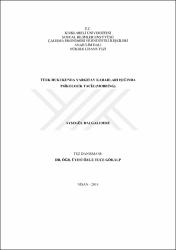| dc.contributor.author | Dalgalıdere, Ayşegül | |
| dc.date | 2019-11 | |
| dc.date.accessioned | 2019-12-02T13:34:58Z | |
| dc.date.available | 2019-12-02T13:34:58Z | |
| dc.date.issued | 2019 | |
| dc.identifier.citation | Dalgalıdere, A. (2019). Türk Hukukunda Yargıtay Kararları Işığında Psikolojik Taciz (Mobbing). Yüksek Lisans Tezi. Kırklareli Üniversite Sosyal Bilimler Enstitüsü, Kırklareli. | |
| dc.identifier.uri | https://hdl.handle.net/20.500.11857/1114 | |
| dc.description.abstract | İşyerinde psikolojik taciz (mobbing); çalışanın özgüvenini zedelemeyi, onu çalışma ortamı içinde sindirmeyi, itibarsızlaştırmayı ve nihayetinde etkisiz hale getirmeyi hedefleyen sinsi ve ahlakdışı bir saldırıdır. Çoğunlukla failin bozuk kişiliğinden kaynaklanan işyerinde psikolojik tacizin, sadece hedef seçilen çalışana değil, çalışanın ailesine, iş ortamındaki diğer çalışanlara, örgütün işleyişine ve ekonomik hayata yıkıcı etkileri bulunmaktadır. Batı dünyasında 1980'li yıllardan itibaren tartışılmaya başlanan ve 1990'lardan itibaren de yasal olarak düzenlenmeye başlanan işyerinde psikolojik taciz, ülkemizde 2012 tarihli Türk Borçlar Kanunu md. 417 ile yasal zemine kavuşturulmuştur. Türk doktrininde, kavramın tanımı ve unsurları konusunda genel olarak ortak paydanın sağlanabildiği söylenebilirse de, mağdurların hukuki başvuru yollarının netleştirildiğini söylemek güçtür. Bu noktada, işyerinde psikolojik tacizin hala TCK kapsamında suç olarak düzenlenmeyişi, mağdurların sosyal güvenlik kapsamında korunmayışı ciddi eksiklikler olarak sayılabilir. | |
| dc.description.abstract | Mobbing in the workplace; is an insidious and immoral attack aimed at undermining employee self-confidence, intimidating, pacifying, and ultimately neutralizing it in the work environment. Mobbing, which mostly originates from the corrupt personality of the perpetrator, has devastating effects on the functioning of the organization and the economic life, not only the targeted employee but also the employee's family and other employees in the work environment. Mobbing in the workplace, which was started to be discussed in the Western world since the early 1980s and started to be legally regulated since the 1990s, was brought to a legal basis with the 417th article of the Turkish Law of Obligations. In Turkish doctrine, it can be said that the common denominator can be provided about the definition and elements of the concept, but it is difficult to say that the legal remedies of the victims are clarified. At this point, the fact that the mobbing in the workplace is still not organized as a crime under the Turkish Criminal Law and the lack of protection of the victims in the scope of social security can be considered as serious deficiencies. | |
| dc.language.iso | tur | |
| dc.publisher | Kırklareli Üniversitesi Sosyal Bilimler Enstitüsü | |
| dc.rights | info:eu-repo/semantics/openAccess | |
| dc.rights.uri | http://creativecommons.org/licenses/by-nc-nd/3.0/us/ | * |
| dc.subject | İşyerinde Psikolojik Taciz | |
| dc.subject | Mobbing | |
| dc.subject | Yıldırma | |
| dc.subject | İşverenin İşçinin Kişiliğini Koruma Yükümlülüğü | |
| dc.subject | Haklı Fesih | |
| dc.subject | Mobbing in the Workplace | |
| dc.subject | Terrorization | |
| dc.subject | Employer's Obligation to Protect the Personality of the Worker | |
| dc.title | Türk Hukukunda Yargıtay Kararları Işığında Psikolojik Taciz (Mobbing) | |
| dc.title.alternative | Mobbing at workplace in the light of supreme court decisions in Turkish law | |
| dc.type | masterThesis | |
| dc.department | Meslek Yüksekokulları, Lüleburgaz Meslek Yüksekokulu, Mülkiyet Koruma ve Güvenlik Bölümü | |
| dc.relation.publicationcategory | Tez | |
| dc.institutionauthor | Dalgalıdere, Ayşegül | |





















